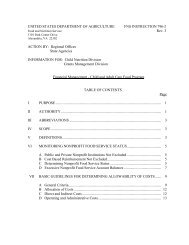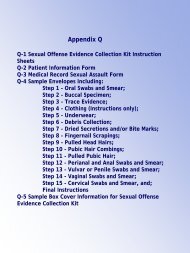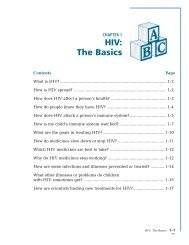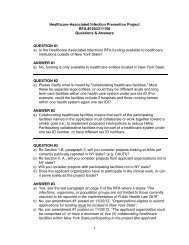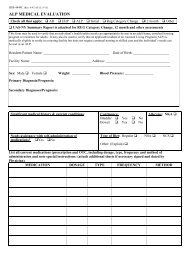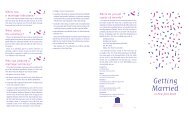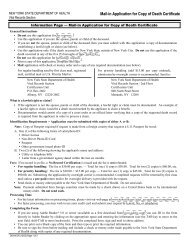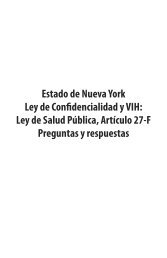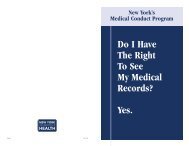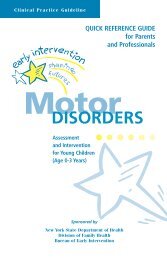Talking with Young People about HIV and AIDS - New York State ...
Talking with Young People about HIV and AIDS - New York State ...
Talking with Young People about HIV and AIDS - New York State ...
You also want an ePaper? Increase the reach of your titles
YUMPU automatically turns print PDFs into web optimized ePapers that Google loves.
Table of Contents<br />
Why it is Important to Talk<br />
<strong>with</strong> <strong>Young</strong> <strong>People</strong> <strong>about</strong> <strong>HIV</strong> <strong>and</strong> <strong>AIDS</strong> 2<br />
Facts <strong>about</strong> <strong>HIV</strong> <strong>and</strong> <strong>AIDS</strong> 3<br />
How to Get Started 7<br />
What to Say to Your Children About <strong>HIV</strong> <strong>and</strong> <strong>AIDS</strong> 8<br />
<strong>Talking</strong> <strong>with</strong> <strong>Young</strong> Children (Ages 5 to 8) 8<br />
<strong>Talking</strong> <strong>with</strong> Older Children (Ages 9 to 12) 10<br />
<strong>Talking</strong> <strong>with</strong> Teens (Ages 13 to 19) 12<br />
<strong>HIV</strong> <strong>and</strong> Sexually Transmitted Diseases (STDs) 14<br />
Using Condoms to Prevent <strong>HIV</strong> <strong>and</strong> Other STDs 15<br />
Phone Numbers <strong>and</strong> Websites for More Information 17<br />
1
Why it is Important to Talk <strong>with</strong><br />
<strong>Young</strong> <strong>People</strong> <strong>about</strong> <strong>HIV</strong> <strong>and</strong> <strong>AIDS</strong><br />
<strong>HIV</strong> is a serious virus that leads to <strong>AIDS</strong>. This disease is killing people of all<br />
ages, all over the world. Many young people in the United <strong>State</strong>s have <strong>HIV</strong><br />
or <strong>AIDS</strong> or could get <strong>HIV</strong> by having sex or using drugs at early ages. There<br />
are medications that have helped people living <strong>with</strong> <strong>HIV</strong> or <strong>AIDS</strong> live longer,<br />
healthier lives. Some people have lived for more than 20 years <strong>and</strong> have taken<br />
medications for more than 10 years. But, there is no cure.<br />
<strong>Young</strong> people hear <strong>about</strong> <strong>HIV</strong> <strong>and</strong> <strong>AIDS</strong> on TV <strong>and</strong> radio <strong>and</strong> from their friends.<br />
They read <strong>about</strong> it in newspapers, in magazines, <strong>and</strong> on the Internet. The<br />
things they hear <strong>about</strong> <strong>HIV</strong> <strong>and</strong> <strong>AIDS</strong> may not be 100% true. Do your children<br />
know the truth <strong>about</strong> <strong>HIV</strong> <strong>and</strong> <strong>AIDS</strong>? Will your children know how to protect<br />
themselves from <strong>HIV</strong>? You can help fight this disease by giving your children<br />
the facts. The sooner you talk <strong>with</strong> your children <strong>about</strong> <strong>HIV</strong> <strong>and</strong> <strong>AIDS</strong>, the more<br />
able they will be to make healthy choices <strong>about</strong> sex <strong>and</strong> drugs. When you talk<br />
<strong>with</strong> your children, you:<br />
• Give your children the facts <strong>about</strong> <strong>HIV</strong>, in a way that is right for<br />
their age.<br />
• Help them make healthy choices to protect themselves for life.<br />
• Let your children know what things are important to you <strong>and</strong> what you<br />
want for them.<br />
2
Facts <strong>about</strong> <strong>HIV</strong> <strong>and</strong> <strong>AIDS</strong><br />
You do not have to be an <strong>HIV</strong>/<strong>AIDS</strong> expert to talk <strong>with</strong> your children <strong>about</strong> it.<br />
You do not need to have all the answers to their questions. There are many<br />
places to go to find those answers. The facts in this section are written to help<br />
you, as a parent or caregiver, learn more <strong>about</strong> <strong>HIV</strong> <strong>and</strong> <strong>AIDS</strong>. Later in this book,<br />
you will learn what facts <strong>about</strong> <strong>HIV</strong> <strong>and</strong> <strong>AIDS</strong> may be best for children to learn<br />
at different ages. It will help to know the basics yourself to make sure that you<br />
give your children the facts.<br />
What is <strong>HIV</strong>?<br />
<strong>HIV</strong> is the Human Immunodeficiency Virus. It is the virus that causes <strong>AIDS</strong>.<br />
You may hear that someone is <strong>HIV</strong>-infected or has <strong>HIV</strong> disease. Both terms<br />
mean that the person has <strong>HIV</strong> in his or her body <strong>and</strong> can pass (transmit) the<br />
virus to other people.<br />
<strong>HIV</strong> attacks the body’s immune system. The immune system protects the body<br />
from getting germs <strong>and</strong> disease. Over time, most people <strong>with</strong> <strong>HIV</strong> become less<br />
able to fight off the germs that get into their bodies every day. These germs<br />
usually do not make a healthy person sick. But when the immune system gets<br />
weaker from <strong>HIV</strong>, these germs can cause infections <strong>and</strong> cancers that can kill a<br />
person. There are medications that fight <strong>HIV</strong> <strong>and</strong> help the immune system stay<br />
stronger for a longer time. But, there is no cure to get <strong>HIV</strong> out of the body or a<br />
shot (vaccine) to prevent <strong>HIV</strong>. Once a person has <strong>HIV</strong> infection, he or she has it<br />
for life <strong>and</strong> can pass the virus to others.<br />
What is <strong>AIDS</strong>?<br />
<strong>AIDS</strong> st<strong>and</strong>s for Acquired Immune Deficiency Syndrome. It is the late stage<br />
of <strong>HIV</strong> infection. A person has <strong>AIDS</strong> when the immune system becomes very<br />
weak from <strong>HIV</strong> infection or when he or she gets one or more serious illnesses<br />
because of the <strong>HIV</strong>.<br />
<strong>People</strong> who are infected <strong>with</strong> <strong>HIV</strong> often do not get <strong>AIDS</strong> for up to ten years or<br />
longer. Some people have lived <strong>with</strong> <strong>HIV</strong> infection for more than 20 years.<br />
<strong>HIV</strong> medicines can help people <strong>with</strong> <strong>HIV</strong> live longer, healthier lives.<br />
3
How do you get infected <strong>with</strong> <strong>HIV</strong>?<br />
Your age, sex, race, ethnic group, religion, income, or sexual orientation does<br />
not matter - anyone can get infected <strong>with</strong> <strong>HIV</strong>.<br />
You can get <strong>HIV</strong> in these ways:<br />
• By having sex <strong>with</strong>out using a condom <strong>with</strong> someone who has <strong>HIV</strong>.<br />
• By sharing needles, syringes, or other equipment or works<br />
(spoons, cotton, bottle caps) that have already been used by someone<br />
who has <strong>HIV</strong> to shoot drugs, steroids, or even vitamins or medicine.<br />
• Women <strong>with</strong> <strong>HIV</strong> can pass the virus to their babies during pregnancy,<br />
delivery, or breastfeeding.<br />
• Healthcare workers can get <strong>HIV</strong> if they get stuck <strong>with</strong> needles that have<br />
blood or body fluids <strong>with</strong> <strong>HIV</strong>. This can happen by accident<br />
at work.<br />
You cannot get <strong>HIV</strong> from:<br />
• casual contact – being near someone who has <strong>HIV</strong> or by shaking h<strong>and</strong>s,<br />
touching, or hugging someone <strong>with</strong> <strong>HIV</strong><br />
• someone <strong>with</strong> <strong>HIV</strong> sneezing or coughing near you or on you<br />
• someone’s tears, saliva, or sweat<br />
• sharing drinking glasses, plates, forks, knives, or spoons<br />
• using public bathrooms <strong>and</strong> drinking fountains<br />
• mosquito bites or other bug bites<br />
• swimming pools or hot tubs<br />
• pets<br />
4
How can you prevent <strong>HIV</strong>?<br />
Do not have sex. This is sometimes called abstinence. Not having sex is the only<br />
sure way to not get <strong>HIV</strong>. But, using a latex male condom or a female condom<br />
can greatly lower the chances of passing <strong>HIV</strong> through sex. See page 16 for<br />
instructions on how to use a condom.<br />
Do not share needles to inject anything. You can totally protect yourself<br />
from getting <strong>HIV</strong> from needles <strong>and</strong> syringes by not shooting drugs or sharing<br />
needles for any reason. If you cannot stop shooting drugs, take these steps to<br />
lower the chances of getting <strong>HIV</strong>:<br />
• Always use new, clean needles <strong>and</strong> syringes.<br />
• If you cannot get new, clean needles <strong>and</strong> syringes, clean your needles<br />
<strong>and</strong> works <strong>with</strong> bleach <strong>and</strong> water right after using them <strong>and</strong> just before<br />
using them again.<br />
• Do not use other drugs, like alcohol, marijuana, crystal meth, ecstasy,<br />
cocaine, or crack. These drugs can prevent you from making good<br />
choices <strong>about</strong> sex <strong>and</strong> <strong>about</strong> using new, clean needles <strong>and</strong> works. If you<br />
are drunk or high, you may not protect yourself <strong>and</strong> others from <strong>HIV</strong>.<br />
Can you tell if someone has <strong>HIV</strong>?<br />
No. <strong>People</strong> may look <strong>and</strong> feel<br />
healthy even though they have<br />
<strong>HIV</strong>. Many people who have<br />
the virus do not even know it<br />
because they do not have<br />
symptoms for many years.<br />
It is a Fact: <strong>Young</strong><br />
<strong>People</strong> are at Risk for<br />
<strong>HIV</strong> <strong>and</strong> <strong>AIDS</strong>!<br />
About half of all high school<br />
students in the United <strong>State</strong>s have<br />
sex. And at least half of all new<br />
<strong>HIV</strong> cases in the United <strong>State</strong>s are<br />
among people under age 25.<br />
(U.S. Centers for Disease Control<br />
<strong>and</strong> Prevention, 2004)<br />
5
How can you find out if you have <strong>HIV</strong>?<br />
The only sure way to tell if you have <strong>HIV</strong> is to get an <strong>HIV</strong> test, either a blood test<br />
or an oral fluid test, which takes a swab from the inside of the mouth.<br />
• An anonymous <strong>HIV</strong> test is when you do not give your name. You are<br />
given an ID number to get your results.<br />
• A confidential <strong>HIV</strong> test means you give your name when you are tested.<br />
Your test results become part of your private health record.<br />
• In some places you can get a rapid <strong>HIV</strong> test <strong>and</strong> get results on the same<br />
day. If your test shows that you might have <strong>HIV</strong>, you will need a second<br />
test to learn for sure if you have <strong>HIV</strong>.<br />
Any person, no matter what age, can be tested if he or she underst<strong>and</strong>s:<br />
• what the test is for;<br />
• what the test result means; <strong>and</strong><br />
• the types of care <strong>and</strong> treatment for people who test positive for <strong>HIV</strong>.<br />
Before the test, an <strong>HIV</strong> test counselor or health care provider will make sure that<br />
the person getting tested underst<strong>and</strong>s these three points. Taking the test can be a<br />
hard choice for a young person. Try to support your child’s choice <strong>and</strong> offer help.<br />
Some clinics offer free, anonymous <strong>HIV</strong> tests. Many local health department<br />
clinics, community health centers, hospitals, family planning clinics, <strong>and</strong><br />
doctors offer confidential <strong>HIV</strong> tests. Call the phone numbers at the end of<br />
this booklet to find testing sites near you.<br />
Are young people at risk for getting <strong>HIV</strong>/<strong>AIDS</strong>?<br />
Yes. Anyone of any age can get <strong>HIV</strong> by having sex <strong>with</strong>out a condom or by<br />
sharing needles. At least half of all new <strong>HIV</strong> cases in the United <strong>State</strong>s are<br />
among young people (under age 25, including teens). Most young people get<br />
<strong>HIV</strong> by having sex <strong>with</strong>out using a condom. They are also getting sexually<br />
transmitted diseases (STDs) more than ever before. Once you have an STD,<br />
it is easier to get <strong>HIV</strong>.<br />
6
How to Get Started<br />
Make this the start of many talks <strong>about</strong> <strong>HIV</strong>. You do not have to cover all the<br />
facts in one talk. Let your children know that it is okay to talk <strong>with</strong> you <strong>about</strong><br />
this <strong>and</strong> other serious topics.<br />
Here are some tips for getting started:<br />
• Ask your children what they already know <strong>about</strong> <strong>HIV</strong> <strong>and</strong> <strong>AIDS</strong>. This can<br />
be a good way to start talking <strong>and</strong> to find out any wrong facts they may<br />
have.<br />
• Ask your children what they have learned <strong>about</strong> <strong>HIV</strong> <strong>and</strong> <strong>AIDS</strong> in school<br />
<strong>and</strong> how they feel <strong>about</strong> it. You can then give your children more facts<br />
<strong>and</strong> talk <strong>about</strong> how you would like them to stay protected from <strong>HIV</strong>.<br />
• Talk <strong>with</strong> your children’s teachers to find out what they teach in school<br />
<strong>about</strong> <strong>HIV</strong>/<strong>AIDS</strong>.<br />
• Look for reasons to bring up the topic. You may be watching a TV show<br />
where a person has to decide whether or not to have sex. Or, you may<br />
be <strong>with</strong> your children <strong>and</strong> hear a news story <strong>about</strong> <strong>AIDS</strong> on the radio.<br />
These are good times to ask your children, “What do you think <strong>about</strong><br />
this?” <strong>and</strong> to let them know what you think <strong>and</strong> feel.<br />
• If your children have questions you cannot answer, admit that you do<br />
not know the answer. Offer to find the answer together. See page 18<br />
for phone numbers <strong>and</strong> websites that can help.<br />
7
What to Say to Your Children<br />
<strong>about</strong> <strong>HIV</strong> <strong>and</strong> <strong>AIDS</strong><br />
What you say to your children <strong>about</strong> <strong>HIV</strong> depends on their age, whether or not<br />
they can underst<strong>and</strong> the facts, <strong>and</strong> their experiences <strong>with</strong> <strong>HIV</strong>. For example,<br />
young children may not be ready to learn some facts that teenagers need to<br />
know to protect themselves. Other kids may know people living <strong>with</strong> <strong>HIV</strong> or<br />
<strong>AIDS</strong>. The next three parts of this booklet give you ideas <strong>about</strong> what to say<br />
<strong>about</strong> <strong>HIV</strong> <strong>and</strong> <strong>AIDS</strong> to children of different ages: young children (ages 5 to 8),<br />
older children (ages 9 to 12), <strong>and</strong> teenagers (ages 13 to 19).<br />
<strong>Talking</strong> <strong>with</strong> <strong>Young</strong> Children<br />
(Ages 5 to 8)<br />
Children this age may be more aware of <strong>HIV</strong>/<strong>AIDS</strong> than you may think. But they<br />
may also have fears <strong>and</strong> wrong facts <strong>about</strong> <strong>HIV</strong>/<strong>AIDS</strong> that you can help clear up.<br />
Ask your children to tell you what they know or have heard <strong>about</strong> <strong>HIV</strong>/<strong>AIDS</strong> <strong>and</strong><br />
start from that point.<br />
This age is not too early to give facts that will help children know how <strong>HIV</strong> <strong>and</strong><br />
<strong>AIDS</strong> work. Kids this age can learn the basic idea that germs cause sickness.<br />
If you teach the basics <strong>about</strong> how to stop sickness <strong>and</strong> how to make good<br />
choices to stay healthy, it will help your children underst<strong>and</strong> <strong>HIV</strong>/<strong>AIDS</strong> when<br />
they are older. Because people die of <strong>AIDS</strong>, be ready to talk <strong>about</strong> death <strong>and</strong><br />
dying. It may help to talk <strong>with</strong> your children <strong>about</strong> someone close to you who<br />
has died.<br />
8
What to tell young children <strong>about</strong> <strong>HIV</strong>/<strong>AIDS</strong>:<br />
Healthy habits<br />
• Wash your h<strong>and</strong>s to prevent the spread of germs.<br />
• Cover your mouth when you cough or sneeze.<br />
• Keep cuts <strong>and</strong> scrapes clean.<br />
• If you are bleeding, find an adult you know <strong>and</strong> trust who can help.<br />
<strong>HIV</strong> is hard to get <strong>and</strong> share<br />
• <strong>HIV</strong> is a virus (germ) that causes <strong>AIDS</strong>. <strong>HIV</strong> gets from one person’s blood<br />
into another person’s blood <strong>and</strong> makes that person sick.<br />
• <strong>HIV</strong>/<strong>AIDS</strong> is not in everyone’s blood.<br />
• You cannot get <strong>HIV</strong> by reading, playing, talking, hugging, kissing,<br />
or eating <strong>with</strong> someone who has the virus.<br />
• Do not touch blood. If you find needles or sharp objects, stay away from<br />
them. Getting shots from a doctor or nurse is okay. Do not trade blood<br />
as blood brothers or blood sisters.<br />
• Do not be afraid if you meet someone <strong>with</strong> <strong>HIV</strong> or <strong>AIDS</strong>. Treat that person<br />
the same way you want to be treated when you are sick – <strong>with</strong> caring<br />
<strong>and</strong> kindness. <strong>People</strong> do not get <strong>HIV</strong> or <strong>AIDS</strong> because they are bad.<br />
9
<strong>Talking</strong> <strong>with</strong> Older Children<br />
(Ages 9 to 12)<br />
Children in this age group begin learning more <strong>about</strong> <strong>HIV</strong>/<strong>AIDS</strong> at school,<br />
from TV <strong>and</strong> movies, or from the Internet. They may know someone who is<br />
living <strong>with</strong> <strong>HIV</strong> or someone who has died from <strong>AIDS</strong>. If they have the wrong<br />
facts <strong>about</strong> <strong>HIV</strong> <strong>and</strong> how it is spread, you can help them get the right facts.<br />
Tips for talking <strong>with</strong> kids <strong>about</strong> sex <strong>and</strong> drugs<br />
At this age, children’s bodies <strong>and</strong> feelings change fast. They often feel very<br />
self-aware or awkward <strong>about</strong> their bodies. They may be more curious <strong>about</strong> sex<br />
<strong>and</strong> want to express their feelings <strong>about</strong> sex. They also may want to try alcohol<br />
<strong>and</strong> drugs.<br />
You may feel that children in the fourth or fifth grades are too young to learn<br />
<strong>about</strong> sex <strong>and</strong> drugs. You may choose to talk to your children <strong>about</strong> these things<br />
now or wait until they are older. It is up to you. Even if you wait to have your<br />
first talk until your children are older, you can still tell them that people get <strong>HIV</strong><br />
by having sex <strong>and</strong> by sharing needles <strong>and</strong> drug works. Kids this age feel a lot<br />
of peer pressure — pressure from friends <strong>and</strong> other kids their age to try new<br />
things that can hurt them (like smoking <strong>and</strong> drinking). All of these are reasons<br />
to talk <strong>with</strong> your children before they start taking chances <strong>with</strong> sex <strong>and</strong> alcohol<br />
or other drugs.<br />
<strong>HIV</strong>/<strong>AIDS</strong> basics for older children:<br />
10<br />
• Review the basics <strong>about</strong> getting <strong>HIV</strong> <strong>and</strong> how to prevent it — do not use<br />
alcohol or other drugs, do not have sex, <strong>and</strong> do not share needles <strong>and</strong><br />
other drug works.<br />
• If you talk <strong>about</strong> sex <strong>and</strong> drugs – tell you children it is better to wait<br />
until you are an adult to have sex <strong>and</strong> to make sex part of an adult,<br />
loving relationship. <strong>People</strong> who do have sex should always use a<br />
condom. Having sex <strong>with</strong>out a condom is a risk for getting <strong>HIV</strong>.
• Using alcohol or drugs<br />
makes it harder to<br />
make good choices —<br />
like not having sex<br />
<strong>and</strong> always using a<br />
condom if you do<br />
have sex.<br />
• Do not trade blood<br />
in blood brothers or<br />
blood sisters games.<br />
• Do not share needles<br />
for any reason – even to<br />
inject insulin (for diabetes),<br />
steroids, or vitamins or for<br />
tattooing or body piercing. If you do<br />
inject drugs, always use a new, clean needle.<br />
Peer Pressure <strong>and</strong> Bullying<br />
Abstinence:<br />
The Only Way to<br />
Stay 100% Safe!<br />
Abstinence means not to do something<br />
at all. The only 100% sure way to stay<br />
protected from <strong>HIV</strong> is not to have sex <strong>and</strong><br />
not to shoot drugs. Not using alcohol <strong>and</strong><br />
drugs (even drugs that you do not inject,<br />
like marijuana, cocaine, ecstasy, or other<br />
pills) can also help prevent <strong>HIV</strong>. How?<br />
When people drink <strong>and</strong> do drugs, they<br />
may make bad choices <strong>and</strong> take<br />
chances <strong>and</strong> may not protect<br />
themselves from <strong>HIV</strong>.<br />
Kids in this age group can be mean to each other. They pressure or threaten<br />
others to try risky things like smoking cigarettes, drinking, doing drugs, or<br />
having sex. They make fun of or bully other kids who will not take chances.<br />
Even friends sometimes make each other feel “uncool” for not taking chances.<br />
Let your children know that real friends will not pressure them or make fun of<br />
them for playing it safe. Tell your children it is okay to talk to adults they trust<br />
(a teacher, parent, or older relative) if they feel unhappy or pressured.<br />
11
<strong>Talking</strong> <strong>with</strong> Teens<br />
(Ages 13 to 19)<br />
Teenagers grow apart from their families <strong>and</strong> want to do more things on their<br />
own. They want to “fit in” <strong>with</strong> others in their age group. Many teens have<br />
strong personal values <strong>and</strong> make choices every day. But they are also under<br />
a lot more pressure to try alcohol <strong>and</strong> other drugs <strong>and</strong> to have sex. Your teens<br />
may make good choices to stay away from alcohol, drugs, <strong>and</strong> sex. But they still<br />
need to know that they can get <strong>HIV</strong> or an STD by having sex <strong>with</strong>out a condom<br />
or by sharing needles or works — even just once.<br />
<strong>HIV</strong>/<strong>AIDS</strong> basics for teens:<br />
• Abstinence is the only sure way to prevent the spread of <strong>HIV</strong>.<br />
The best way to protect yourself from <strong>HIV</strong> is not to have any<br />
kind of sex (vaginal, oral, or anal) <strong>and</strong> not to inject drugs.<br />
• Use a condom. Use a latex male condom or a female condom the<br />
right way each time you have sex. Other forms of birth control such as<br />
the pill, Norplant, or Depo-Provera do not protect you from <strong>HIV</strong> or other<br />
sexually transmitted diseases.<br />
• Do not use alcohol <strong>and</strong> other drugs. They make it harder to say<br />
“no” to having sex — or to use a condom if you do have sex.<br />
• Never share needles to inject anything.<br />
• Body piercing or tattooing needles can also have blood <strong>with</strong> <strong>HIV</strong>.<br />
If your children are going to get tattoos or body piercings, find an artist<br />
who uses only new, clean needles <strong>and</strong> safe tools.<br />
12
Teens, Dating, <strong>and</strong> Sex:<br />
What They are Saying <strong>and</strong> Doing<br />
You may hear your teens talk <strong>about</strong> going out <strong>with</strong> friends instead of<br />
dating. Or, you may hear them talk <strong>about</strong> hooking up or having friends<br />
<strong>with</strong> benefits. These terms may not mean anything to you, but they have<br />
special meaning for young people. Learn what these terms mean <strong>and</strong> know<br />
what your teens are doing.<br />
Even if teens are not dating, they still<br />
feel a lot of pressure to have sex.<br />
Hooking up or having friends <strong>with</strong><br />
benefits means having oral sex<br />
<strong>with</strong> different people — instead<br />
of having vaginal or anal sex<br />
<strong>with</strong> one boyfriend or girlfriend.<br />
Teens are having oral sex more<br />
often than vaginal or anal sex <strong>and</strong><br />
at younger ages. <strong>Young</strong> people see<br />
this as a way to keep their virginity <strong>and</strong><br />
to not get pregnant. Even though oral sex<br />
is less risky sex, you can still get <strong>HIV</strong> <strong>and</strong> STDs<br />
this way or pass these diseases to others.<br />
Good <strong>New</strong>s<br />
About Teen Sex<br />
Fewer teens are having sex:<br />
In 1991, 54% of high school<br />
students in the United <strong>State</strong>s<br />
said they had sex.<br />
In 2003, 47% said they<br />
had sex.<br />
(U.S. Centers for Disease Control<br />
<strong>and</strong> Prevention, 2004)<br />
Tell your teens that it is always okay to say “no” to sex. They may think that<br />
“everyone’s doing it.” Let them know that this is just not true.<br />
13
<strong>HIV</strong> <strong>and</strong> Sexually<br />
Transmitted Diseases (STDs)<br />
<strong>Young</strong> people in the United <strong>State</strong>s are getting STDs more than ever before.<br />
Teens need to know how not to get <strong>HIV</strong> <strong>and</strong> other STDs.<br />
STD Basics:<br />
• <strong>HIV</strong> is one of many STDs. STDs, like <strong>HIV</strong>, are spread from person<br />
to person by vaginal, anal, or oral sex. Some STDs are spread by<br />
skin-to-skin contact.<br />
• If you have an STD, it is easier to get <strong>HIV</strong>.<br />
• Most people have no signs of the STD at all. You may not know if you<br />
or your partner has an STD.<br />
• Some STDs can be cured, some cannot. STDs that are caused by<br />
bacteria — such as gonorrhea, chlamydia, <strong>and</strong> syphilis — can be treated<br />
<strong>and</strong> cured <strong>with</strong> medicine. But, STDs that are viruses — like herpes,<br />
genital warts, <strong>and</strong> hepatitis B — can only be treated. They cannot<br />
be cured.<br />
• Take control, get tested.<br />
The only way to know if you<br />
have <strong>HIV</strong> or another STD is<br />
through a test or exam.<br />
To find out more <strong>about</strong><br />
<strong>HIV</strong> <strong>and</strong> STD testing,<br />
call one of the hotlines<br />
listed on page 18.<br />
Four Million<br />
Teens a Year<br />
About 15 million people in<br />
the United <strong>State</strong>s get an STD<br />
each year. Four million of<br />
those are teens.<br />
(U.S. Centers for Disease Control<br />
<strong>and</strong> Prevention, 2004)<br />
14
Using Condoms to Prevent<br />
<strong>HIV</strong> <strong>and</strong> Other STDs<br />
Latex male condoms <strong>and</strong> female condoms, when used the right way every time,<br />
greatly lower the chances of getting <strong>HIV</strong> <strong>and</strong> many other STDs. Condoms can<br />
prevent the spread of other STDs, like human papillomavirus (HPV) or genital<br />
herpes, only when the condom covers all of the infected area or sores.<br />
Condom Basics:<br />
• Be prepared. Always<br />
have condoms <strong>with</strong><br />
you, even if you do<br />
not plan to have sex.<br />
Never take it for<br />
granted that your<br />
partner will have<br />
condoms —<br />
talk <strong>with</strong> him or<br />
her <strong>about</strong> it before.<br />
Good <strong>New</strong>s<br />
About Teen Sex<br />
More teens are using condoms:<br />
In 1991, 46% of teens in the<br />
United <strong>State</strong>s said they used a<br />
condom the last time they<br />
had sex. In 2003, 63% said they<br />
used a condom the last time<br />
they had sex.<br />
(U.S. Centers for Disease Control<br />
<strong>and</strong> Prevention, 2004)<br />
• Use a condom <strong>with</strong> every<br />
partner, every time. Use a condom<br />
even if you think your partner does not have <strong>HIV</strong> or an STD.<br />
• Stick <strong>with</strong> your choice. If your partner does not want to use a condom,<br />
tell him or her that you do not want to have sex <strong>with</strong>out one.<br />
• How to use a male condom<br />
1. Store condoms in a cool place <strong>and</strong> keep them out of the sun. Check the<br />
expiration date (the “use by” date). This date is on the condom box or<br />
the condom wrapper. Condoms used after this date may rip or tear.<br />
2. Open the condom wrapper carefully. Teeth or fingernails can rip<br />
the condom.<br />
15
3. Put on the condom after the penis is hard. If the penis is not<br />
circumcised, pull back the foreskin before putting on the condom.<br />
Unroll the condom all the way down the penis.<br />
4. Pinch the tip of the condom to leave a little space (<strong>about</strong> a half inch)<br />
at the top. Unroll the condom all the way down the penis.<br />
5. Add a little water-based lubricant (like K-Y jelly) to the outside of<br />
the condom. Never use lubricants <strong>with</strong> oil, like Vaseline or lotion;<br />
these can make the condom break.<br />
6. After ejaculation, hold the rim of the condom <strong>and</strong> pull out while the<br />
penis is still hard, so that no semen spills out.<br />
It is going to take hard<br />
work, by people from all over<br />
the world, to stop the spread of<br />
<strong>HIV</strong> <strong>and</strong> <strong>AIDS</strong>. <strong>Talking</strong> openly to<br />
your children <strong>about</strong> <strong>HIV</strong> <strong>and</strong> <strong>AIDS</strong> is a<br />
big step toward protecting them <strong>and</strong><br />
others.You should feel good <strong>about</strong><br />
taking this important step. Keep<br />
talking <strong>with</strong> your children — <strong>and</strong><br />
keep up the good work!<br />
16
Phone Numbers <strong>and</strong> Websites<br />
for More Information<br />
<strong>New</strong> <strong>York</strong> <strong>State</strong> Department of Health <strong>AIDS</strong> Institute<br />
http://www.health.state.ny.us/diseases/aids/index.htm<br />
This website has booklets, posters, <strong>and</strong> brochures on <strong>HIV</strong>/<strong>AIDS</strong>. Materials can<br />
also be ordered using the order form on the website. Other information <strong>about</strong><br />
<strong>HIV</strong>, like where to get tested in <strong>New</strong> <strong>York</strong> <strong>State</strong>, is also on the website.<br />
<strong>HIV</strong>/<strong>AIDS</strong> Information Hotlines<br />
<strong>New</strong> <strong>York</strong> <strong>State</strong> Department of Health<br />
<strong>HIV</strong>/<strong>AIDS</strong> Hotline (English) 1-800-541-2437<br />
<strong>New</strong> <strong>York</strong> <strong>State</strong> Department of Health<br />
<strong>HIV</strong>/<strong>AIDS</strong> Hotline (Spanish) 1-800-233-7432<br />
<strong>New</strong> <strong>York</strong> City Department of Health <strong>and</strong> Mental Hygiene<br />
<strong>HIV</strong>/<strong>AIDS</strong> Hotline (Spanish/English)<br />
1-800-TALK <strong>HIV</strong><br />
<strong>New</strong> <strong>York</strong> <strong>State</strong> Department of Health<br />
TTY <strong>HIV</strong>/<strong>AIDS</strong> information line 1-212-925-9560<br />
Voice callers can use the <strong>New</strong> <strong>York</strong> Relay System:<br />
call 711 or 1-800-421-1220 <strong>and</strong> ask the operator for 1-212-925-9560.<br />
<strong>New</strong> <strong>York</strong> <strong>State</strong> Education Department<br />
http://www.emsc.nysed.gov/sss/<strong>HIV</strong><br />
This website explains what facts <strong>about</strong> <strong>HIV</strong> <strong>and</strong> <strong>AIDS</strong> are taught in health<br />
education classes in <strong>New</strong> <strong>York</strong> <strong>State</strong> schools. It also has the phone numbers<br />
<strong>and</strong> websites of other groups where you can get more information.<br />
17



